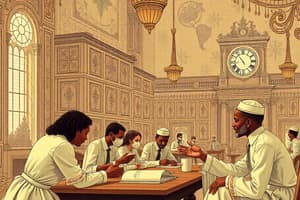Podcast
Questions and Answers
Flashcards
Booker T. Washington
Booker T. Washington
Advocated for gradual progress, emphasizing practical job skills and economic self-reliance for African Americans.
W.E.B. Du Bois
W.E.B. Du Bois
Demanded immediate equal rights, higher education, and an end to discrimination for African Americans.
Atlanta Compromise
Atlanta Compromise
Washington's philosophy that African Americans should focus on economic advancement before social equality.
Tuskegee Institute
Tuskegee Institute
Signup and view all the flashcards
NAACP
NAACP
Signup and view all the flashcards
Talented Tenth
Talented Tenth
Signup and view all the flashcards
Civil Rights
Civil Rights
Signup and view all the flashcards
Economic Independence
Economic Independence
Signup and view all the flashcards
Work within the system
Work within the system
Signup and view all the flashcards
Challenge the system
Challenge the system
Signup and view all the flashcards
Study Notes
- Two significant African American leaders held differing views on attaining equality and success for Black Americans in the late 1800s and early 1900s.
Booker T. Washington (1856-1915)
- Born into slavery in Virginia and gained freedom after the Civil War.
- Washington acquired education through hard work.
- He founded the Tuskegee Institute in Alabama.
- Washington advocated for gradual progress.
- He emphasized acquiring practical job skills and trades.
- Washington encouraged African Americans to learn farming and industrial skills to foster self-reliance by starting businesses.
- He urged acceptance of temporary inequality to build economic strength.
- Washington is known for the quote: “Character is power.”
W.E.B. Du Bois (1868-1963)
- Du Bois was born free in Massachusetts.
- He was the first African American to earn a Ph.D. from Harvard.
- Du Bois co-founded the NAACP (National Association for the Advancement of Colored People).
- He was a writer and scholar.
- Du Bois demanded immediate equal rights.
- He believed in higher education for African Americans.
- He fought for voting rights, civil rights, equal education, and an end to discrimination.
- Du Bois promoted the concept of the "Talented Tenth," where educated Black leaders would guide the community.
- Du Bois is known for the quote: "The problem of the 20th century is the problem of the color line."
Contrasting Approaches
- Washington worked within the existing system.
- He prioritized economic independence.
- He emphasized learning trades and practical skills.
- Washington accepted temporary social inequality.
- Du Bois challenged the system.
- He demanded immediate equal rights.
- He advocated for pursuing higher education.
- Du Bois actively fought against discrimination.
Legacy
- Both Washington and Du Bois had a lasting impact on the Civil Rights Movement.
- Their debate on achieving equality continues to resonate.
- Their differing approaches illustrate the need for diverse solutions to complex problems.
- Both made significant contributions to African American advancement.
Key Terms
- Atlanta Compromise
- Tuskegee Institute
- NAACP
- Talented Tenth
- Civil Rights
- Economic independence
Studying That Suits You
Use AI to generate personalized quizzes and flashcards to suit your learning preferences.




